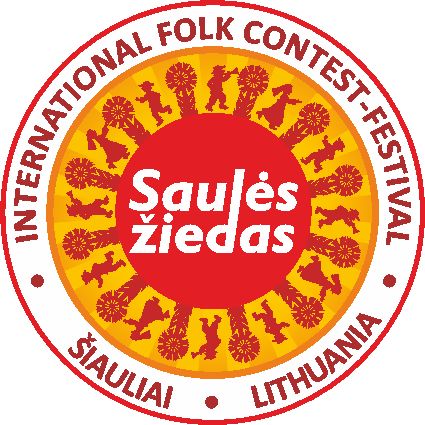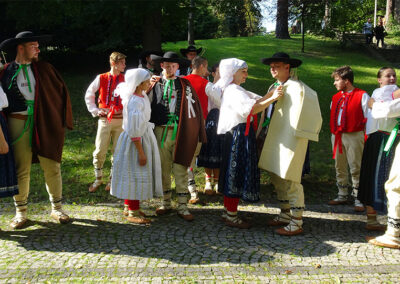After the Second World War, in 1945, the chorus, named as Slezan, was founded in Český Těšín – a town in the North-East of the Czech Republic, on the border with Poland. Ten years later, the folklore group Slezan with its dancing and music part was founded.
The group turns to stage elaborations of the dances and songs from the south-east part of Silesia, i.e. the historic part called Těšínsko, the region from the town of Bohumín to the borders with the Slovak Republic and from the town of Frýdek in the west to the town of Bielsko in the east. This region is very distinctive with specific folklore, full of inner strain and hidden beauty which is very different from the people of other regions of the Czech Republic.
The elaboration of the dances and songs is based on the outcome of the systematic research which was done in this region in the first years of group’s work. The members of the folklore group noted contemporaries’ information about dances, songs, traditions and costumes typical for this region. That is why the presentation of the folklore group Slezan is so highly appreciated among the others as it tries to maintain the originality in every aspect of its work, not omitting the dialect that is the mixture of Czech, Slovak, Polish and German language and which is characteristic for this area and people speak it even till nowadays.
In its choreography Slezan presents dances typical for the region, i.e. figural dances, different rites, traditions or customs and habits. The choice of costumes in which the dancers present the dance depend mostly on dance pattern. The folklore group uses four types of folk costumes at its performances – the costume typical for the town Těšín and its surrounding (called těšínský), the costume from the mountain part of the region, Beskdy mountains (called horalský), the costume of the inhabitants of the town of Jablunkov and its surrounding (called jablunkovský) and the costume typical for the area around the town of Orlová (called orlovský), later influenced by mining (costume called hornický).
The dancing part is accompanied with the cimbalom music at each performance. The cimbalom music consists, apart from very interesting instrument – cimbalom, also of violin, bass and clarinet/flute. Apart from the cimbalom music, there is a bagpipe player who enriches the group performances.
The membership of the group Slezan amounts to approximately 25 people – 20 for dancing part and 5 for music. The greatest flow of new members is from the children’s folklore group Slezanek that was founded in 1979. But the group welcomes every one who loves traditions, dances and songs of the region and who would like to present it to wide public.
During its long existence, which is the sign of unceasing interest not only of the members of the group but also of many beholders, the group has visited a lot of places not only in the Czech Republic, but also in the whole world at different occasions – folklore festivals, contests, shows etc. It has visited most of the European countries, some of them more than once. In Asia, the group visited Mongolia, Turkey and India.
A lot of evaluation shows evidence of group’s home and foreign success. However, the greatest success for the group is the sense of well done work, the feeling that through its performance, still more and more people know about traditional culture, the values of folklore of the region Těšínské Slezsko.
Český Těšín Folklore group „Slezan“
Artistic director
Lenka Foltýnová Glacová




